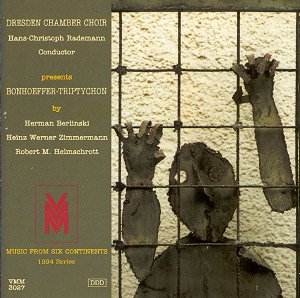Dietrich Bonhoeffer (1906 – 1945) studied at the University
of Tübingen intending to become a theologian. In late 1930 he went
to the Union Theological Seminary in New York. At that time, too, National
Socialism and anti-semitism were gaining alarming political momentum.
Jewish friends and family members were forced to emigrate. Bonhoeffer
personally reacted against Nazism. He became a leader in the Confessing
Church, a group of parishes opposed to the Lutheran Church that had
reached some accommodation with the Nazis. In 1939 Bonhoeffer went back
to New York but decided to return to Germany. He then became a member
of the Abwehr (the German Intelligence Service). His brother-in-law
Hans von Dohnányi, also working for the Abwehr, helped Jews to
leave Germany and was also involved in several assassination plots against
Hitler. The failure of the last attempt in July 1944 sealed Bonhoeffer’s
and von Dohnányi’s fate. They were executed in 1945.
The Bonhoeffer-Triptychon was commissioned by
the Union Theological Seminary from three German composers : Heinz Werner
Zimmermann (not to be confused either with Bernd Alois Zimmermann [1918
– 1970], Walter Zimmermann [born 1949] or Udo Zimmermann [born 1943]),
a Protestant; Robert Helmschrott, a Catholic and Hermann Berlinski,
a Jew who had emigrated to the States. The first performance took place
in New York in August 1992.
The first panel, Berlinski’s Das Gebet Bonhoeffers
("The Prayer of Bonhoeffer"), is scored for soprano, baritone,
chorus, flute, cello, organ and a small percussion (celesta, vibraphone,
bells, crotales and gongs). It is an essentially peaceful setting of
some of Bonhoeffer’s texts and excerpts from The Song of Songs
expressing several aspects of love, earthly as well as heavenly love.
The music sometimes calls Frank Martin to mind.
The central panel, Zimmermann’s Neujahrslied
("New Year’s Song"), is a simple, hymn-like setting for chorus,
double bass and organ of Bonhoeffer’s beautiful and deeply moving poem
Von guten Mächten written when he was in prison.
The third panel, Helmschrott’s Cross and Freedom:
Cantata per ogni tempo (for soprano, tenor, baritone, narrator,
chorus, violin, trombone quartet, organ and percussion), inhabits an
altogether different world, more troubled in mood and more complex in
feeling. His literary sources are manifold: Psalms, texts by Bonhoeffer
and (in the fourth movement) words by Auden (from Friday’s Child)
sung in English. The rattling side drum that opens the first movement
and the trombones’ angry interjections set the scene. My God, why
hast Thou forsaken me? The second movement is about hope whereas
the third one sets parts of Psalm 103. The soprano and the violin enter
in the fourth movement The Homecoming with a beautiful setting
of Auden’s words.
Collective works (just think of Jüdische Chronik)
are rarely wholly satisfying, i.e. from the musical point of view, but
I am most happy to note that this one works remarkably well in spite
– or because of – its stylistic and emotional variety. It is sung and
played with conviction and quite decently recorded (this is a live recording),
though I found the soloists a bit too in the back (or is it a matter
of acoustics). Berlinski and Helmschrott play the organ part in their
respective work, but we are not told who is the organist in Zimmermann’s
piece.
All in all, a worthwhile release and a musically satisfying
experience, and – above all – a splendid tribute to a man who lived
and died for his deepest beliefs.
Hubert Culot
